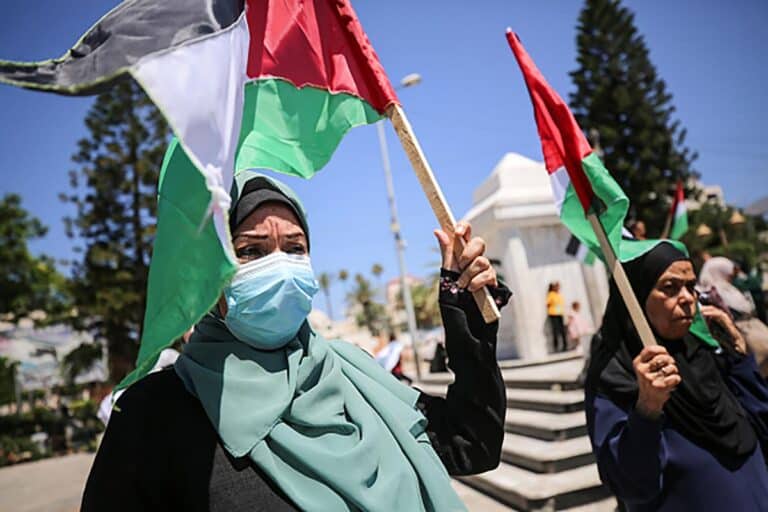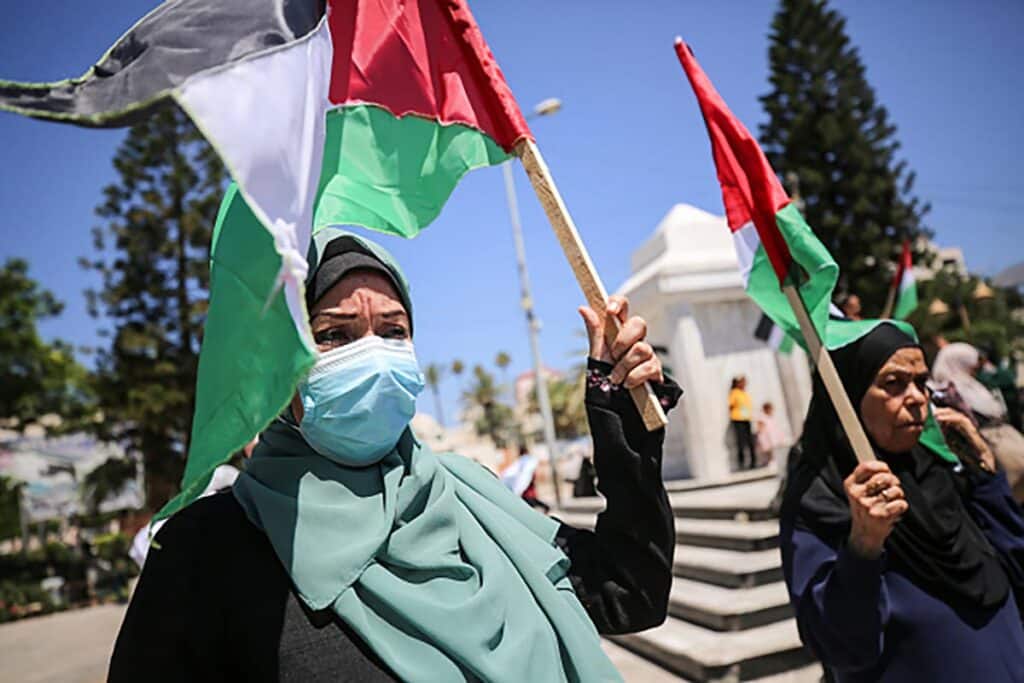
The majority of Palestinians do not support Hamas, but support for the terror group has significantly increased since the Oct. 7 attacks, a recent survey by the Palestinian Center for Policy Survey and Research found.
The poll, released earlier this month, found that the vast majority of Palestinians (72%) believe Hamas was justified in their Oct. 7 attack that killed over 1,200 people and took 250 people hostage.
The Gaza war increases Hamas’ popularity and greatly weakens the standing of the PA and its leadership; nonetheless, the majority of the Palestinians remains unsupportive of Hamas: https://t.co/T2dMcJBEKV pic.twitter.com/lHC0eNfE7E
— Khalil Shikaki (@KShikaki) December 13, 2023
Support for the attack was higher in the West Bank than in Gaza with 82% of West Bank residents backing the massacre compared to 57% of Gazans. Notably, the majority of respondents admitted they had not seen footage of the atrocious attacks.
Support for Hamas has also increased: In the West Bank, 44% of Palestinians said they supported the terror group, up from 32% in September. In Gaza, 42% said they supported Hamas compared to 38% three months prior.
The poll also found an overwhelming rejection of Palestinian Authority (PA) President Mahmoud Abbas, with 88% of Palestinians believing that he should resign.
Additionally, 60% of the respondents said the PA should be disbanded entirely. Middle East researcher and former MK Ksenia Svetlova explained that Palestinians view PA leader Abbas “as a collaborator with the IDF, as a traitor who submitted to Israel…He is deeply unpopular among his own people.”
Hamas vs. the Palestinian Authority
Hamas, an acronym in Arabic for “Islamic Resistance Movement,” is recognized as a terror group by several countries, including the United States.
Emerging as an offshoot of the Egyptian Muslim Brotherhood, it is committed to the destruction of Israel to create an independent Palestinian state and does not recognize Israel’s right to exist.
In contrast, the PA, which evolved from the Palestinian Liberation Organization, was established after the Oslo Accords in the 1990s.
As a relatively more moderate and secular entity, the PA acknowledges Israel’s right to exist and has participated in peace negotiations with Israel.
However, the PA has yet to officially condemn the Oct. 7 attacks. Notably, the PA also has a controversial “pay to slay” program in which they make monthly payments to the families of incarcerated or deceased Palestinian terrorists. This program has been a significant point of contention in Israeli-Palestinian relations.
U.S. officials, including President Joe Biden, have indicated a preference for the PA to assume governance of Gaza after the war, aiming to unify Gaza and the West Bank under a single administrative entity.
The PA governed Gaza until 2007 when Hamas violently took control of the Strip after winning the 2006 election.
Beyond the poll numbers: Voices of dissent against Hamas

Beyond the poll numbers, Palestinians’ personal accounts and human rights issues in Gaza offer a deeper understanding of the situation.
From voices of dissent against Hamas to the struggles faced by LGBTQ+ individuals and women in Gaza, these narratives paint a picture of life under Hamas’s rule.
This dissent was recently documented in a video series, “Whispered in Gaza.” Here are some of the highlights from what Palestinians said.
“The real occupation is Hamas”
In the series, many Palestinians voiced profound dissatisfaction with the current leadership and living conditions in Gaza. All names of the interviewees were changed to protect their privacy.
One of them, Ashraf, a 28-year-old Gazan, expressed deep resentment toward Hamas, saying that they killed his brother in front of him:
“At this time, as a person living in the prison that is Gaza, my prime enemy is Hamas, not the occupation. We’re used to saying ‘occupation’ because we’ve been saying it for a long time, but the real occupation is Hamas. It is a barrier I need to remove from my life. If the Jews come and remove it, I will support them. The Jews didn’t kill my brother, Hamas did.”
We asked a Palestinian in Gaza if anyone supports Israel’s campaign to topple Hamas.
— The Free Press (@TheFP) October 30, 2023
“The Jews didn’t kill my brother; Hamas did.”
We’ve partnered with @PeaceComCenter to gather anonymous testimony from Gazans impacted by the war. pic.twitter.com/BTjVjJCIEA
“We want to live” protests against Hamas
In March 2019, young Gazans took to the streets and social media to protest against Hamas under the slogan “We want to live,” arguing that Hamas has strangled their economic and social prospects.
Many Palestinians expressed discontent that Hamas receives millions of dollars in aid from Qatar while the average Gazan lives in poverty. These protests were not tolerated — Hamas violently dispersed the demonstrators using live ammunition and batons.
Raya, a participant in the protests, recounted the brutal response:
“Three years ago, we protested as part of the ‘We Want to Live’ movement. Our slogan meant that we want a decent life, like any people. The people wanted their voices to be heard by the government. But Hamas responded with the opposite of what we’d hoped. We met arrest, hot pursuit, a hail of bullets — every kind of brutality…They came and raided our house and trashed it, as they did so viciously to many houses. Our crime was wanting to live. The accusation: rebelling against Hamas, serving a foreign agenda, being a ‘collaborator.’ It’s forbidden to speak freely in Gaza.”
Persecution of LGBTQ+ Palestinians
Hamas considers homosexuality a crime that is punishable by death. LGBTQ+ Palestinians have to live in secret, but this is getting harder and harder due to Hamas’ attempts to find them. Undercover Hamas operatives lure gay men with fake social media profiles and torture them when they are discovered.
Gazan resident Abdul spoke to i24 News about the torture gay men endure under Hamas’ rule:
“When I was 17 years old, Hamas caught me when I was having sex with my boyfriend. They imprisoned me for three days. They put me in a tiny room that was two-by-two meters. They wouldn’t let me sleep or go to the bathroom inside. There was no food. They would torture me so badly…”
Persecution of women in Gaza
Women in Gaza are considered second-class citizens and face widespread discrimination under Hamas law. They are forced to adhere to conservative dress codes, which are violently enforced by Hamas operatives.
Women in Gaza face physical and sexual abuse, as there are currently no laws in Gaza that prohibit violence against women. They also aren’t allowed on the bikes and scooters that people in the densely packed enclave use to get around.
Speaking to “Whispered in Gaza,” Gazan citizen Mariam recalled what life was like for women before Hamas took power:
“When I was younger, I was really good at dancing, singing and acting. I want to dance to this day. But after the [Hamas] takeover in 2007, I felt that it was all over. Threats began. They said, ‘Girls shouldn’t be singing. You need to leave that behind, go to the mosques, and read Qur’an.’ Fine, I get it — and we do learn Qur’an at home — but I wanted to develop my talent. Next, they issued a warning: ‘If you keep doing what you’re doing, you’ll go to prison. We’ll be watching you and monitoring your phone.’ Even the dream can’t go further than they allow.”
Who will rule Gaza after the war?
Although Israeli officials have yet to announce the country’s potential role in Gaza’s future, many people suspect that Israel will maintain a military presence in the Strip for years to come.
Prime Minister Benjamin Netanyahu has stressed that he has every intention of demilitarizing Gaza and that he is opposed to letting the Palestinian Authority regain control of the Strip, even if this is the preference of Israel’s strongest ally.
With Palestinians divided over who should be the governing body and no strong leadership, it is difficult to predict what lies ahead for Gazans.
Many young people in Gaza hope for a brighter future free of Hamas. “We want Gaza to be like Tel Aviv, Jerusalem, or Cairo. I don’t want there to be wars and rockets,” Ibrahim said in “Whispered in Gaza.”
“We and the Israelis are one people believing that no one — whether from Gaza, Palestine, or from Israel — deserves these conditions of fear and terror, and that all of us should live in peace,” he added.
Originally Published Dec 31, 2023 06:38PM EST


